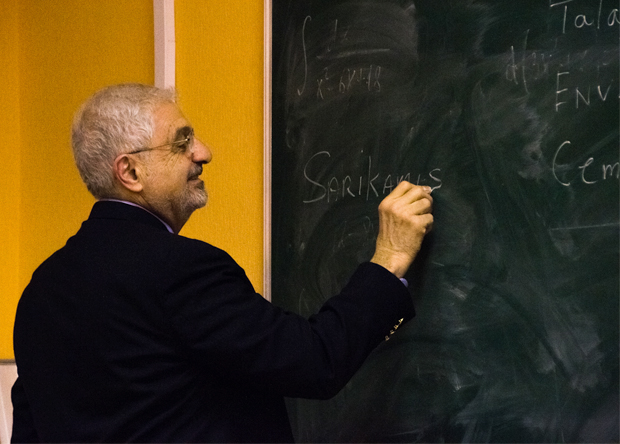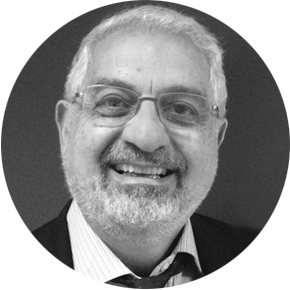Mediamax continues a series of interviews with the intellectuals of Armenia and the Diaspora. It is an attempt to collect opinions as to whether the Armenian Genocide Centennial will serve a certain “New Beginning” for Armenians or not.
Our today’s interlocutor is Ronald Suny, professor emeritus of political science and history at the University of Chicago.
- Which is the main symbol of Armenian Genocide Centennial for you?
- I think this Centennial is a perfect moment for Armenians, Turks and the rest of the world to think seriously about actually what happened and try to move toward.
I think we have moved beyond the absurd denialist positions of many people in the Turkish government, and some odd - I won’t call them scholars - but people who have written on these events. We are now in a situation where most sensible people, anyone who is thoroughly investigating these events, understands that the terrible tragedy that occurred certainly fits any reasonable definition of genocide and now our real question is how we understand why it happened and how such things can be prevented in the future.
That’s the only way that Turks, Kurds, Armenians and other peoples can be reconciled around a fair, objective, analytical understanding of the events and why they occurred.
- What’s the mechanism of understanding why it happened?
- We have made great progress in the last 10-15 years. When I began looking at these events myself there was a very good body of documentation on the events. Since the work of some excellent scholars like Richard Hovhannisyan and Vahakn Dadrian and then Turkish scholars (Taner Akcam and many others), then German scholars like Wolfgang Gerstner, the record is now much clearer than it was.
But there was a hesitation particularly on the part of Armenians to try to explain the events. We certainly knew what happened - we knew the dimensions, but we were a little bit reluctant to try to explain. One prominent scholar once said to me, “Ronald, don’t try to explain the Genocide. If you try to explain why the Young Turks did this, you will rationalize it and then you may justify it”. And so there was a hesitation but social scientists and historians have moved beyond that position and now are trying to explain why such an event would take place. Once you have that body of literature done by scientists and we are well on the way to that, both Armenian scholars, non-Armenian scholars, Turkish and Kurdish scholars, then you have at least the basis, the record on which you can begin to discuss moving beyond simply accusations of who’s guilty, who’s innocent, etc.
When we started with the Workshop in Armenia Turkish Scholarship, (WATS as we call it), some 15 years ago, we had a very difficult time finding good Armenian scholars to come and present papers. I was disappointed that we didn’t have the same kind of growth in scholarship in Armenia that we witnessed in Turkey, particularly in private English language universities, and by Turks and Kurds who were studying abroad at the University of Michigan, University of Chicago and elsewhere.
But that has been changing, and I am really happy for that. After all Armenia is a belligerent state, it’s besieged, it’s surrounded by dangers and threats and therefore there is kind of establishment of scholarship which is fearful of changing the orthodox standard narrative. There is a high degree of nationalism and chauvinism in Armenia, which prevents the objective study of history on this event which may be seen threatening or playing into the hand of political enemies.
There is a younger group already studying at the University of Michigan, and elsewhere who are questioning the old orthodoxies, and are beginning to develop new views. Whether they can penetrate the hegemonic dominant view of the establishment in Armenia, that’s difficult question. That’s a political and social question. But even the fact, that you would come and do an interview with someone who years ago or still is called a “traitor” just because I am doing this kind of research. That shows that development is happening, people are questioning the old conventional ways of thinking and looking for new understanding. You can’t hold the young down, you can’t hold this new generation back, they are already in contact with Western scholars and they are going to make a breakthrough. It will be slow but it will eventually happen.
- What do you think about present the state of Armenia-Diaspora relations?
- First of all, the Diaspora before 1991 did not know Armenia well. Much of the Diaspora was so hostile to the Soviet Union, and to Soviet Armenia that they didn’t know anything except that it was a beautiful place to go, and maybe see the old churches.
When finally the Diaspora “met” Armenia and they began to see they really are different cultures. The U.S. Armenian Diaspora is not the same as the French Diaspora, or the Lebanese Diaspora or Istanbul – they all are very different. Those Diasporas are very different not only from one another but from Armenia itself. There was kind of a shock about the country with its Soviet legacy, with its different understandings of history and future. So there was a cultural divide which people simply were not aware of because they imagined that because we’re all Armenian, that we share exactly the same values and understanding.
And then, Armenia’s problems are different from the Diaspora’s problems. Armenia has serious security problems, it faces powerful enemies on its frontiers. And so there is a tremendous danger facing Armenia and its government that in fact, the Diaspora is concerned about. But they have different understandings about how that problem might be solved.
 Ronald Suny
Ronald SunyPhoto: Russian Higher School of Economics
The next thing is there are times, when the Diaspora feels it is superior to Armenia, it’s rich, it’s sophisticated, it’s cosmopolitan, and they can give advice to Armenia. Understandably, Armenians in Armenia may be resentful that they are treated as inferiors who need help, who need to be guided, who need to be directed. So you have not only different cultures but also different levels of understanding and different levels of sense of superiority or inferiority, that also obviously attained that relationship.
We may be distant, the Diaspora may not understand the specificities of our homeland, Armenian culture, and politics and its needs, but they are concerned and they have much to give to Armenia materially, intellectually, culturally, etc. I think probably the best way that it can be accomplished is ongoing dialog rather than any idea that somehow we are all the same, that we somehow can subordinate our differences to a single, common statement of some kind, rather we should continue the dialog which will only enrich both the Diaspora and the homeland.
- There are opinions that after the Centennial the Genocide factor will start to lose its strength and something like identity crisis may start in the Diaspora. Do you think this is something real or artificial?
- I think it’s something artificial. The Genocide is a reality, it happened, it will always be painful for Armenians, like the Holocaust for the Jews.
It will be central to Armenian identity, but what we might lose if there is recognition of the Genocide, it is the open wound which this Genocide has festered for now 100 years precisely because people refuse to look straight, honestly at what happened and why it happened. They continue to try bury it under the denials, lies and fictions. That wound might begin to heal but the fact of Genocide, just like the fact of other things of Armenian history - our ancient language, our survival over millennia - will continue to be part of a much richer and much deeper Armenian identity.
- Please tell us about your new book?
- The book is called “They Can Live in the Desert but Nowhere Else: The History of the Armenian Genocide”. This quote is taken from Talaat Pasha who said this to the American Ambassador of the time in Istanbul, Henry Morgenthau. The book is a an analytical narrative which tries to tell step by step the history of Armenians and Turks and how they came to this terrible moment when the Ottoman government decided to deport and annihilate several of its constituent subject peoples, particularly, Armenians and the Assyrians.
The book makes an argument that a kind of emotional universe developed among Turks and Kurds, what I call, affective disposition that made it possible for the leaders of the Ottoman Empire and many of their followers to conceive of Armenians as an existential threat to the preservation of their state and the Turkish nation. In that emotional environment, Armenians were then thought such a great danger they had to be physically eliminated. So I want to show the roots of that understanding on the part of the Turks to this colossal crime.
Ara Tadevosyan talked to Ronald Suny
Also read:
Fr. Mesrop Aramian’s interview
Mark Grigoryan’s interview
Ralph Yirikian’s interview
Avetik Chalabyan’s interview
Ruben Vardanyan’s interview
Razmik Panossian’s interview
Gerard Libaridian’s interview





















